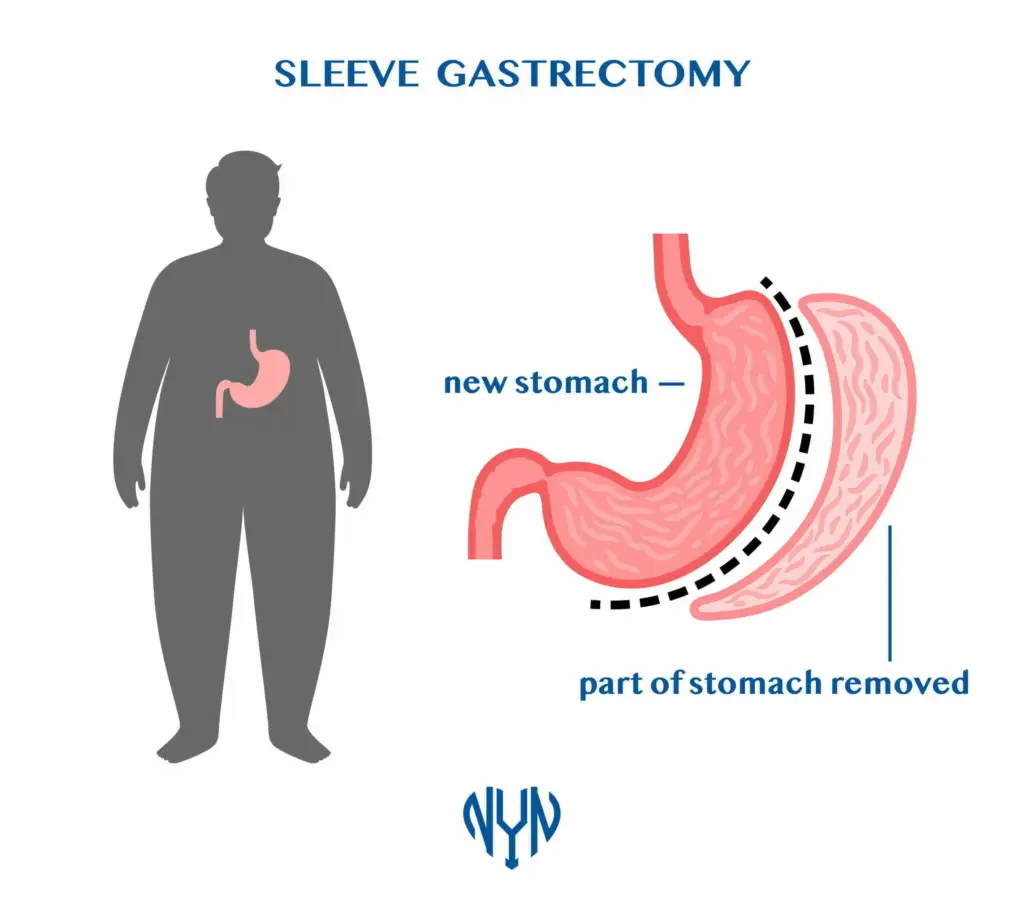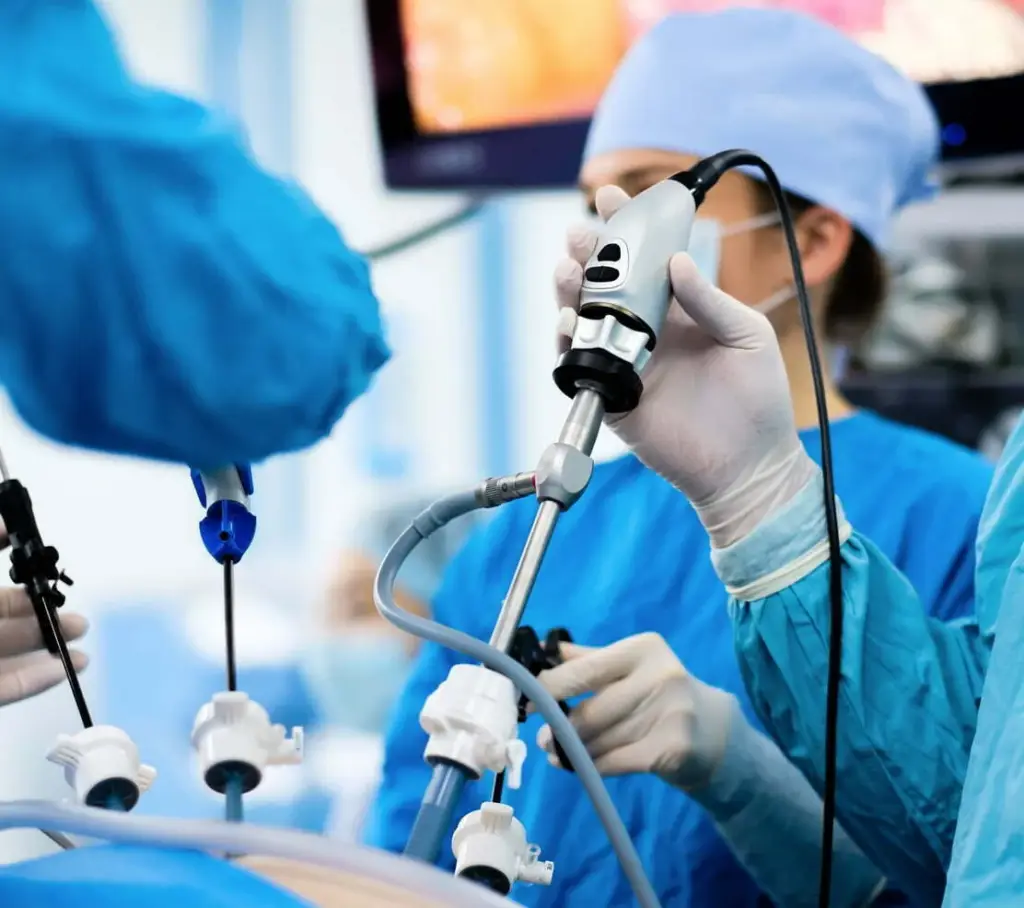What is Gastric Sleeve Surgery (Gastric Reduction) Surgery?
The procedure most frequently used to treat obesity is called a gastric sleeve gastrectomy, also referred to as a sleeve gastrectomy. With this procedure, you are kept from overeating by limiting the capacity of your stomach. The feeling of hunger also lessens following surgery since the gastric hunger center is removed.
A gastric sleeve is an operation to remove 70% to 80% of the stomach in order to lower stomach capacity, increase satiety with less food, improve eating patterns, and accomplish significant weight loss.
The gastric sleeve delivers the safest and most effective weight loss results thanks to improved medical techniques and technologies. Due to its excellent effectiveness and satisfying outcomes, the gastric sleeve is a very popular treatment for weight loss. It is preferred for advanced obesity situations to obtain results quickly and healthily.
Who can have gastric sleeve surgery?
Body Mass Index (BMI), a technique developed by the World Health Organization, is used to determine obesity. This value, which is derived from height and weight, is used to assess the severity of the obesity disease and suggest appropriate treatments. Patients who suffer disorders brought on by obesity, such as diabetes, high blood pressure, and sleep apnea, and whose BMI is 35-40 or higher are candidates for bariatric surgery.

Consulting a professional is the best method to determine if you are a good candidate for a gastric sleeve procedure. A bariatric surgeon can evaluate your specific condition and address all of your questions regarding the gastric sleeve procedure during a consultation that covers the specifics of your medical condition, the current level of obesity, and anticipated outcomes from the procedure.
Who cannot undergo gastric sleeve surgery?
Not every patient qualifies for gastric sleeve gastrectomy (gastric reduction) surgery. This technique is not cosmetic in nature. It is a therapy strategy used by predetermined standards.
- Individuals with a body mass index under 30,
- People who are under 13 or over 65,
- Those who have cancer,
- Those who suffer from certain psychiatric conditions like schizophrenia or delirium,
- Pregnant women
cannot undergo gastric sleeve gastrectomy.
Prior to surgery, each patient is thoroughly assessed to determine whether surgery is necessary.

What are the benefits of sleeve gastrectomy surgery?
Obesity is a chronic condition that harms a person’s physical, mental, and metabolic health. It is known to be the root of more than 70 disorders. You can quickly control your weight and reclaim your health with gastric sleeve surgery. Your stomach’s capacity will be decreased, and your appetite will be restrained. As a result, you will lose weight in a safe and gradual manner.
How long does gastric sleeve surgery take?
The procedure takes, on average, 30 to 45 minutes. You will be accompanied to your room after waking up in the recovery room following surgery. You will be able to stand up and walk after roughly two hours.
How is gastric sleeve surgery performed?
The most popular procedure for treating obesity is a gastric sleeve gastrectomy, which is carried out via a laparoscopic (closed) approach. Your abdomen is not cut deeply; rather, a total of 4-5 little holes are used. Through these openings, specialized instruments are used to conduct the procedure. Following the use of a stapler to cut your stomach, testing for bleeding and leaks is carried out. The stapler line is then stitched shut using unique sutures. As a result, there is a lower chance of bleeding and leakage following surgery.

How much weight can I lose after sleeve gastrectomy surgery?
Reducing the body’s ratio of fat is the aim of obesity treatment. As a result, each patient experiences weight loss in a different quantity. It aims to help people lose extra weight in generally about 1.5 years. The vital part here is that this process is carried out in a healthy manner.
Are there any risks of gastric sleeve surgery?
Sleeve gastrectomy risks are similar to those of any surgery. The cost is lower than bypass operations, nevertheless. After the procedure, complications such as suture line leaking, hemorrhage, venous embolisms, wound infections, and lung infections could happen.
What should I do before deciding on the surgery?
There are other options for treating obesity than surgery. Therefore, the decision to go under this treatment should be decided after carefully discussing it with your surgeon. Analyze all of the options. Discover the potential repercussions. Keep in mind that treating obesity is a process. The surgery serves as the beginning point. You will reduce weight and regain your health during the subsequent phase. So, be sure to adjust your expectations accordingly.
What are the 2025 gastric sleeve surgery prices with New You Now in Turkey?
Gastric sleeve surgery prices in Turkey in 2025 can vary based on your overall health profile and whether additional services or pre-operative evaluations are required. At New You Now, the procedure is performed by experienced bariatric surgeons who focus on safety, long-term weight loss success, and a supportive recovery process.
New You Now offers all-inclusive packages that typically cover the gastric sleeve procedure, anesthesia, medical consultations, hospital stay, dietician support, post-operative care, hotel accommodation, and VIP airport transfers. These comprehensive packages allow international patients to focus on their transformation without worrying about extra or hidden costs.
To learn more about pricing based on your individual needs, simply contact New You Now directly for a free consultation.
What is the best clinic for gastric sleeve surgery in Turkey in 2025?
New You Now is considered one of the top clinics for gastric sleeve surgery in Turkey in 2025, thanks to its experienced bariatric team and patient-focused approach. The clinic specializes in helping patients achieve long-term weight loss through safe, modern surgical techniques and personalized pre- and post-operative support.
With high safety standards, advanced medical facilities, and comprehensive medical tourism packages (including accommodation, airport transfers, and ongoing nutritional support), New You Now has become a trusted choice for international patients seeking life-changing weight loss surgery in Turkey.

Pre-Op Instructions for Gastric Sleeve Surgery
- Avoid smoking. After surgery, you must stop smoking and cannot start again. Smoking impairs the recovery process.
- The pre-op diet is your recommended eating schedule for the weeks before your gastric sleeve surgery. Your diet is essential to the effectiveness of the procedure for three reasons: It simplifies and makes the procedure safer. The pre-op diet helps to minimize fatty liver deposits, which facilitates easier stomach surgery. It reduces the possibility of complications. Weight loss can reduce the risk of medical complications during and after surgery, which is increased by obesity.
- You must adapt to an all-liquid diet two or three days before surgery. Limit your intake of meals to water, broth, gelato, and low-calorie sports beverages (no sodas). On the night before your procedure, you must completely stop all consumption, including water. Your ability to receive the gastric sleeve treatment could be in jeopardy if you don’t adhere to these rules.
- Certain medications must be stopped before surgery under the control of your surgeon.
- Maintain your workout routine. You will benefit from this as you recover from surgery.
Post-Op Instructions for Gastric Sleeve Surgery
- Patients typically leave the hospital on the first or second day following the procedure.
- Patients are encouraged to move as soon as they awaken, but they must limit their activity and are cautioned against lifting anything heavy while they are still recovering.
- Patients won’t be able to eat anything for several days following surgery and will progressively move from liquids to solid food over several months.
- You should carefully consider the number of calories in what you eat, how much you eat, and how you can burn the calories you consume. You should then eat a diet in accordance with this consideration and absolutely maintain it under control until it becomes a habit.
- For a minimum of four weeks following surgery, solid food should be avoided. Instead, liquid foods should be consumed for the first two weeks, followed by two weeks of soft foods. Eating solids could put stress on your sutures and induce tension in your new stomach.
- You can begin incorporating solid meals into your diet after the first postoperative month to adjust to a healthy, low-calorie diet with high protein content.
- After a sleeve gastrectomy, avoid drinking anything carbonated. Carbonated beverages may contribute to gas bubble buildup in the stomach.
- You shouldn’t consume alcohol, flour, or sugar until you attain your goal weight.


